#College Admission Strategies
Explore tagged Tumblr posts
Text
Crafting Futures: A Counsellor’s Odyssey | The Invogue Life
The weight of the golf club represented the goals of my teenage years. As I lined up for my first shot of the season, I remembered my coach’s words: "It’s not the strength of the swing but the quality of the impact that counts
#College Counselling Services#NCAA Scholarships and Recruitment#International Student College Applications#College Admission Strategies#Personalized College Guidance#High School to College Transition#College Application Tips
0 notes
Text
Navigating College Admissions: Choosing the Right Major
Navigating College Admissions and Major Selection I am a high school senior, diligently preparing my applications to several prestigious colleges. Among these, my dream school stands out, particularly as I aim to pursue a competitive major that makes admission more challenging. I find myself at a crossroads regarding my intended major. Although I am deeply passionate about my chosen field, I have…
#college admissions#college application strategy#competitive majors#ethical implications#evolving interests#high school senior#linguistics#major selection
1 note
·
View note
Text
Top Strategies to Make Your US University Application Stand Out in 2024
When applying to US universities, it's essential to make your application stand out, especially when targeting top schools. From submitting early applications to crafting a compelling personal statement, strong letters of recommendation, and showcasing extracurricular activities, several key strategies can boost your chances of acceptance. Highlight unique achievements and tailor your application to each university for the best results. For a detailed guide, visit How to Make Your Application Stand Out.
#how to stand out in US university applications#tips for applying to US universities#personal statement tips#US university admission advice#college application strategies#getting into US universities#letters of recommendation for college#early action vs early decision
0 notes
Text

Strategies for Graduates in Aircraft Maintenance Engineering to Navigate the Employment Market
#aircraft maintenance engineering#ame colleges#ame courses#aircraft maintenance engineering colleges in pune#wcat ame#aircraft maintenance engineering admission#aircraft maintenance engineering colleges in india#ame stratergies#strategies for aircraft maintenance job market
0 notes
Photo

In my last article, How to Improve Your Vocabulary for the SAT & ACT, I wrote about improving your vocabulary. In this article, I want to dive more deeply into how vocabulary is tested on the SAT Reading test and explore techniques to solving the types of questions you can expect to appear.
On the Evidence-Based Reading and Writing section of the SAT, there is a subscore for questions that fall into the category known as “Words in Context.” These questions test your ability to detect both the meanings and the functions of common words and phrases in various circumstances. There’s a fairly even distribution of Words in Context questions throughout the test (about two per Reading and Writing passage), and approximately 20% of your total Reading and Writing score will come from these types of questions. There is specifically one type of question that tends to frustrate students endlessly: Vocabulary in Context.
I often hear my students argue that you could make a case for each of the answer choices on vocabulary in context questions. Sometimes, students present sound reasoning for why they thought an answer choice could have been correct; other times, students present the “it sounded right” argument.
So how do you actually decide between the four answer choices? You put on your analytical thinking cap! Since these questions require you to be sensitive to a word’s connotations and pay attention to the way a word is used in the moment, it is important to understand the way language is connected. To see what I mean, let’s explore a couple of examples.
1. The first and more commonly seen type of vocabulary in context question deals with using context clues to determine the meaning of a word or phrase in a particular instance (vocabulary in context).
“See!” he said, after a moment, “isn’t that 25 mist or something, over there to the right —away in a line with that great piece of rock?” And he indicated with his hand. As used in line 26, “great” most nearly means A) wonderful. B) powerful. C) extensive. D) large.
The word in question is “great,” a frequently occurring word with multiple meanings. All four answer choices are definitions of the word “great.” To determine the answer here, reread the context (generally the sentence in question and the sentences above and below it) and try to fill in the word in question with your own word. You should also examine these sentences for any clues that may point you in the right direction. In this instance, the speaker is referring to a “great piece of rock” and indicating a direction with his hand. The description of the rock is being used in a physical context, so we want an answer that has something to do with size. If I were to replace “great” with my own word, I’d choose something along the lines of “huge.” Now let’s look at the answer choices.
Choice A doesn’t work because the word “wonderful” is subjective. What may be wonderful to you may not be so for me.
Choice B is incorrect because “powerful” doesn’t exactly describe a rock and has nothing to do with size.
Choice C does deal with the physical aspect, but it’s not a precise fit to describe a rock.
Choice D is the correct answer. If someone were pointing out a “great piece of rock,” you would likely look in the direction of the biggest rock around.
Occasionally, you will come across an answer choice that is not synonymous with the word in question. You should delete such a choice immediately because it is not answering the question (even if it “sounds good” when plugged into the passage). For example, if the word “sphere” (a circular object) is in question and one of the answer choices is “box” (often rectangular), you can safely bet it will not be a correct response.
2. The second type of vocabulary in context question deals more with how the author’s use of words affects the passage’s meaning or tone (purpose of vocabulary in context)
This event was caused by the merger of two black holes, one with a mass estimated at 36 times the mass of the Sun and the other with an estimated mass 29 times the Sun’s. The result was a single black hole of about 62 solar masses. On December 26, 2015, gravitational waves from a second event were observed, once again from the merger of two black holes, though this time the black holes were smaller. Both events occurred approximately 1.3 billion years ago. How do the words “estimated,” “about,” and “approximately” help establish the tone of the paragraph? A) They create a skeptical tone that makes clear the team does not believe that the data are accurate. B) They create a hopeful tone that makes clear the team anticipates that more gravitational waves will soon be found. C) They create a tentative tone that suggests that the team cannot determine certain values with precision. D) They create a defiant tone that makes clear the team is aware that its results contradict widely held views.
On these types of questions, again revisit the context and look for a connection. The paragraph includes the phrases “mass estimated at 36 times,” “with an estimated mass 29 times,” “black hole of about 62 solar masses,” and “approximately 1.3 billion years ago.” Do you notice a trend? Each of these words has to deal with a prediction about measurements of mass or time; none of the claims are made with 100% certainty. Now let’s look at the answer choices.
A) “Skeptical” means doubtful, which could potentially work when making a prediction, but there is no clear evidence pointing to the data as inaccurate, so this choice is contradictory.
B) Within the context of the paragraph, there isn’t much in the way of hope being expressed, so this answer choice goes further than what is directly stated in the paragraph.
C) “Tentative” means uncertain, which matches the trend of the words in question. Also, “cannot determine certain values with precision” fits well with the numbers (36, 29, 62, 1.3 billion) next to each of the words in question. Choice C is the correct response.
D) “Defiant” means disregardful, which is much too strong given the context. Nowhere in the paragraph is there any justification for such a charged answer choice.
You may have noticed that each of the answer choices contains an adjective (skeptical, hopeful, tentative, defiant) followed by reasoning. It’s important to read the entirety of the answer choice to make sure both halves work.
These two examples demonstrate the types of vocabulary in context questions you can expect to see on the SAT Reading test. Practicing these questions can be difficult in the absence of a test, so here’s my recommendation: add “Professor Word” to your online bookmark bar and it will identify SAT/ACT vocabulary words on any website that you visit. When you come across a “tier-two” word (a high-frequency word that has multiple meanings), see if you can replace it with a word of your own then check whether your prediction is correct by plugging the original word into a thesaurus. If you get into the habit of practicing this technique, your ability to tackle vocabulary in context questions will become second nature.
As with anything that deals with the reading test, mastering vocabulary in context questions is a marathon not a sprint. If you follow the methods outlined in this article, you can expect your success rate on these questions to increase. Eventually, you may even reach a point where you can predict the answers to all vocabulary in context questions before even looking at the choices! Let that be your guiding goal.
0 notes
Text
If you're appalled by the Supreme Court's illegitimate rulings, you should understand that Biden had the opportunity to fix the problem and chose not to:
https://www.reuters.com/world/us/biden-calls-us-colleges-consider-adversity-during-admission-process-2023-06-29/
Biden told MSNBC in New York that the court "may do too much harm but I think if we start the process of trying to expand the court, we are going to politicize it maybe forever, in a way that is not healthy."
He decided he did not want to expand the Supreme Court to prevent harms like the recent decisions.
You might also remember this:
Which directly leads to:
Democrats. And Biden specifically. Find it useful for Republicans to do horrific things because it brings in votes. They've actively told us they have no incentive to fix these problems because the problems are useful.
Ignoring the threat posed by the Supreme Court's illegitimate justices was a campaign tactic; letting life get worse for us brings in more votes than fixing the problem does.
You're being manipulated. The very least you can do is demand a better candidate.
32 notes
·
View notes
Text
ON THE COURT— 020: why nobody gaf
smau + written!
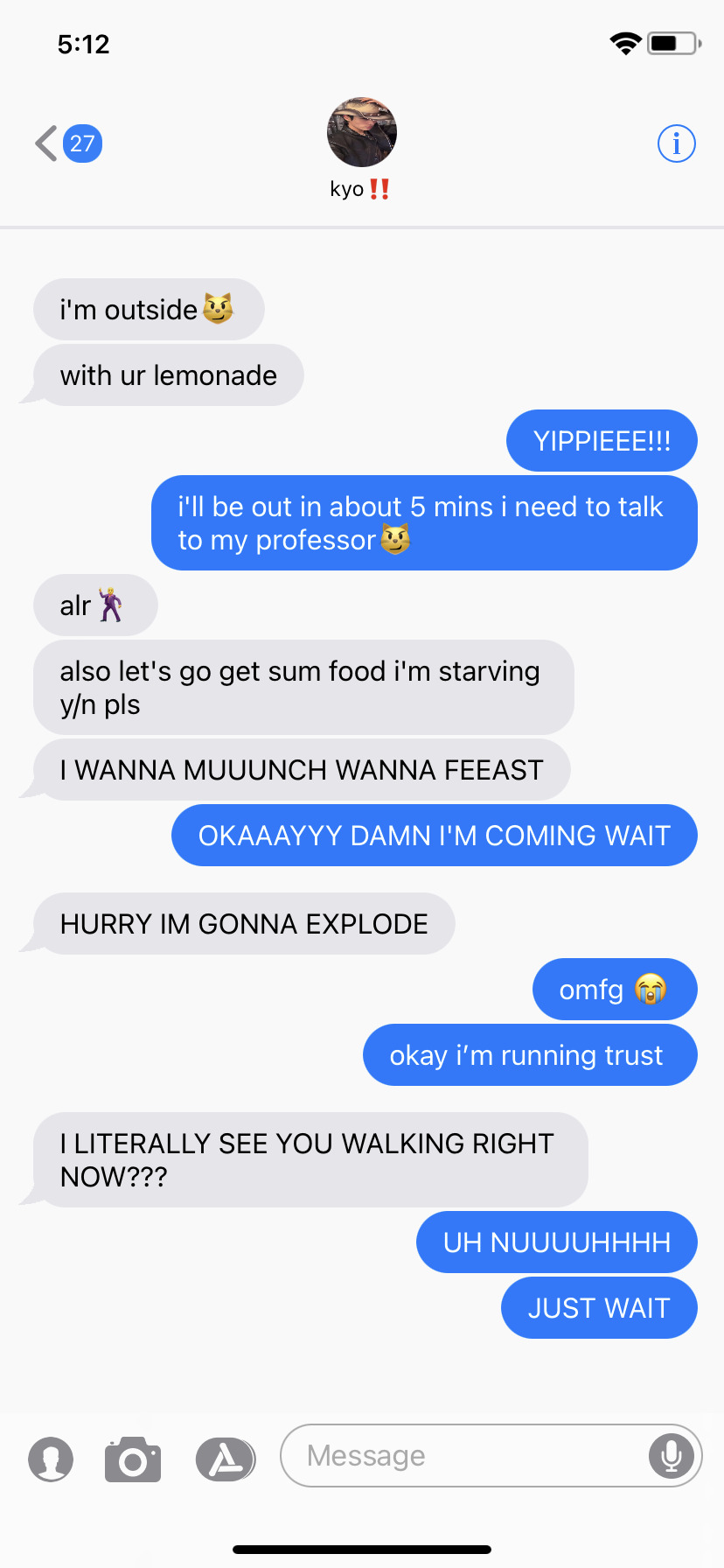
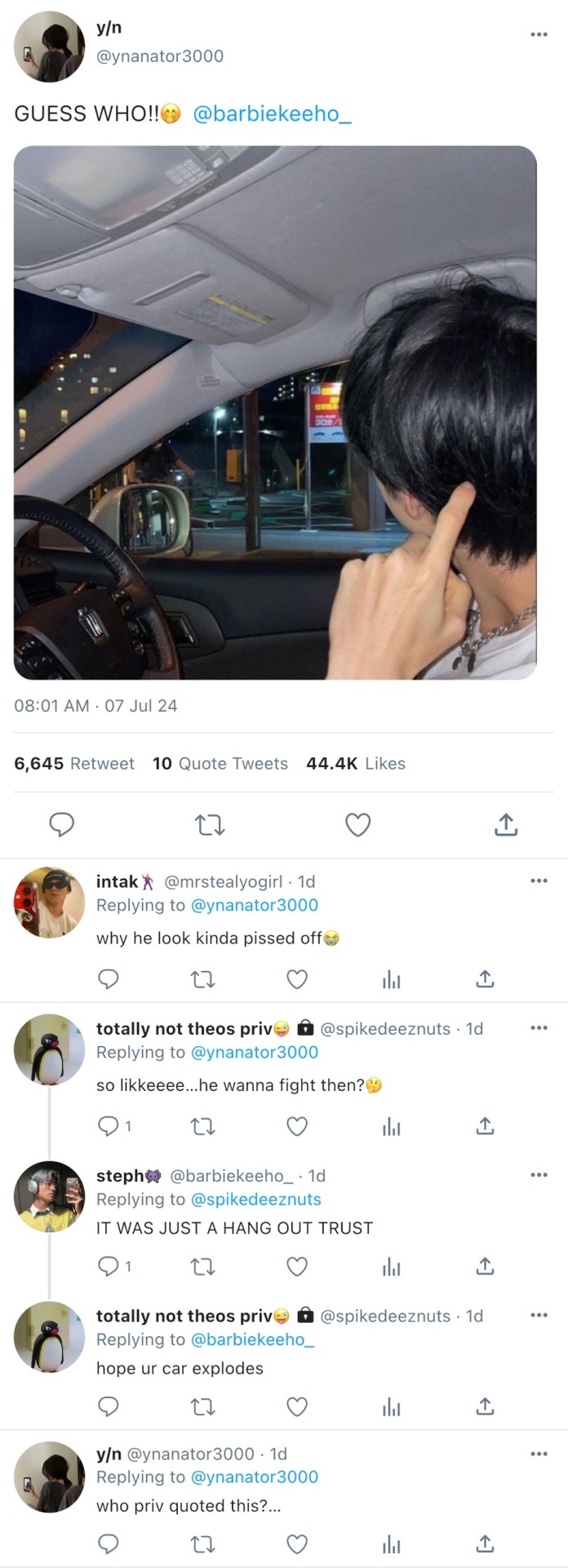
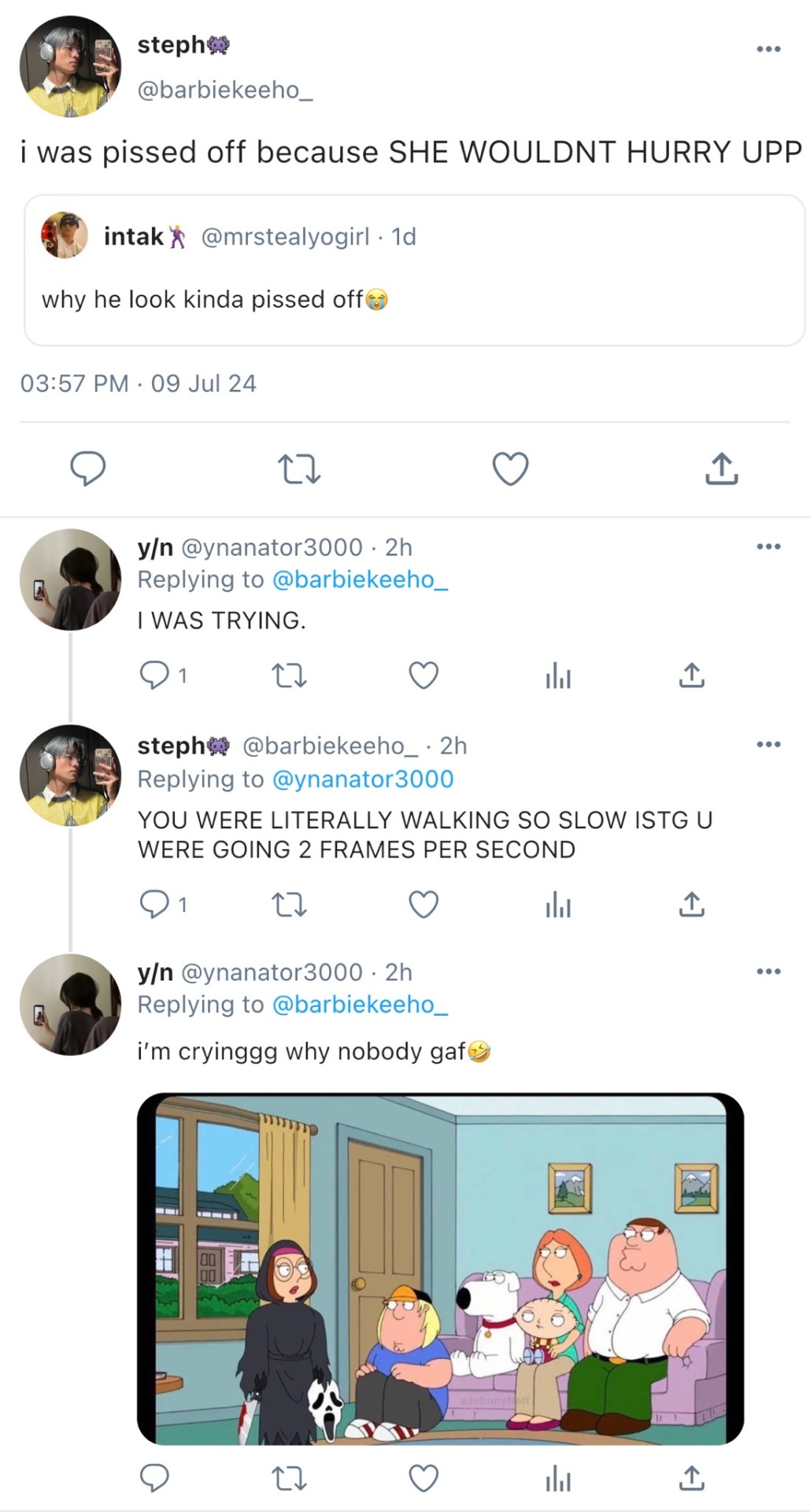
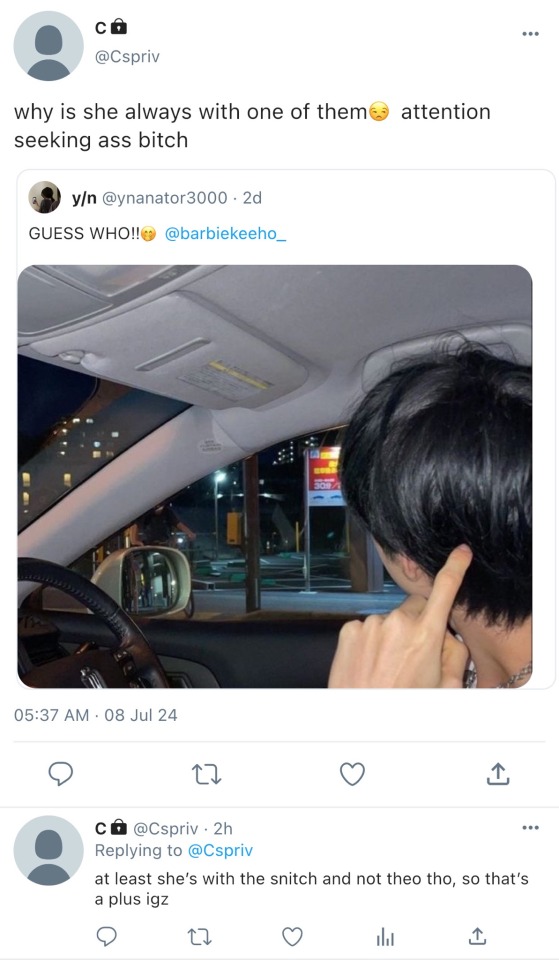

Keeho and Y/N strolled through the college campus’ grassy walkway, the early evening air crisp and cool, tinged with the lingering warmth of the setting sun. The sky above them painted a breathtaking canvas of orange and pink hues as daylight slowly surrendered to the approaching night. The both of them walked in companionable silence, the soft shuffle of their footsteps mingling with the distant fading hum of campus life.
After a while, Y/N broke the quietness, her voice hesitant yet determined, "So, Cora..." She glanced over at Keeho, who visibly tensed at the mention of her name. His shoulders stiffened, and his usually relaxed demeanor was replaced by a hard edge, the tension rolling off him in palpable waves.
Keeho's expression darkened briefly before he managed a wry chuckle, the sound hollow and forced. "I almost forgot we were supposed to talk about her." His shoulders sagged with disappointment, a silent admission of the weight Cora's actions bore on his mind. "I'm sorry. I just can't be friends with her if she's done something to hurt you or Theo. You two were my friends first; it wouldn't be fair to either of you." Y/N nodded her opinion towards the taller, shifting her coffee cup from one hand to the other; the warmth seeping into her cold fingers. "Well, it's not so much Theo. He still thinks she's innocent, but I know what she's done." His voice was low, yet there was a firmness in the tone that spoke of his unwavering resolve.
Finding a nearby bench, Keeho sighed heavily as he sat down, the weight of their conversation pressing on his chest. He gestured for Y/N to join him, and she did, crisscrossing her legs tightly together for a comfortable position on the park bench. The wooden surface was cool against her skin, grounding her amidst the emotional storm. "You know how Cora used to be our high school manager," he began, his voice tinged with frustration and bitterness. "We had a fundraiser to get new uniforms for the new season and the new members of the team, but instead of handing the money we earned over to the coach, she spent it on herself—her wants and needs."
Y/N murmured sympathetically, her gaze fixed on Keeho instead of the distant horizon where the last traces of daylight were fading. Her heart ached at the betrayal he must have felt, her own feelings of indignation mixing with his.
"And then there was the year we made it to nationals," Keeho continued, his tone turning somber, each word a painful reminder of lost dreams. "It was everything to Theo and me. But during the match, it became so obvious that the opposing team knew our strategies and game plan flawlessly. Theo didn't catch on, but I did. During a break between matches, I went to find Cora and caught her messing around with the captain of the opposing team. She was willingly leaking our plays and tactics to them, and because of what she did, we lost our shot at the championship, and we haven't made it back since."
As Keeho finished recounting the betrayal, he gazed out across the campus, his eyes focusing on a distant point as if trying to remember every detail of that moment. He took a deep breath, his exhale filled with a mixture of lingering disappointment and unresolved frustration. "It shattered Theo to lose like that. He blames himself for being too lenient as a captain."
The campus around them had quieted further as evening settled in, the occasional murmur of students passing by fading into the stillness. In that moment, Y/N felt a surge of empathy for her friend, her heart heavy with the gravity of Cora's actions.
"That's just awful," Y/N murmured, her voice tinged with disbelief and compassion. "It's like she was only in it for how it would look on her college application." She shook her head, struggling to comprehend how someone could be so selfish.
Keeho nodded solemnly. "Yeah, it felt like she was playing a game and using us in the process." His words were laced with bitterness, a testament to the deep hurt he felt.
"I'll distance myself from her," Y/N declared softly, her tone resolute and unwavering. "I don't want to hurt you, and frankly, I wouldn't want to be associated with someone like her anyway." Her loyalty and sense of justice burned brightly, a stark contrast to Cora's deceit.
Keeho managed a small, appreciative smile, grateful for Y/N's unwavering support. "Thanks, Y/N. It means a lot." His voice softened, the weight on his shoulders lightening slightly with her reassurance.
They sat in companionable silence for a moment longer before Keeho's expression shifted, his brow furrowing with a mix of hesitation and concern. "There's something else you should know about Cora," he began slowly, as if unsure how to broach the topic.
Y/N turned to him, her curiosity piqued. "What is it?" Her eyes searched his face, seeking the truth behind his troubled gaze.
Keeho took a deep breath, choosing his words carefully. "Back in high school... Cora had feelings for Theo." His voice was low, each word heavy with the weight of long-buried secrets.
Y/N's eyes widened in surprise. "You just keep on surprising me, huh?" She let out a chuckle, trying to lighten the mood but feeling a knot of unease forming in her stomach.
"Yeah," Keeho continued, his voice tinged with sympathy and regret. "She was pretty obvious about it, at least to me. But Theo... he never noticed. He was always so focused on the team. I think Cora saw the tournament as a way to get his attention, to make him jealous maybe." His words trailed off, leaving a heavy silence between them.
"So that's why she did the things she did," Y/N mused quietly, piecing together the puzzle in her mind. "She thought it would make him jealous..." Her heart ached for Theo, who had been oblivious to the turmoil around him.
Keeho nodded sadly. "I think so. But Theo was oblivious to her feelings. He never saw her that way." His voice was soft, filled with a mix of pity and sorrow for the pain Cora had caused.
Y/N sighed softly, feeling a mix of compassion and relief. "It's still no excuse for what she did. She could have handled her feelings differently." Her voice was firm, her resolve unshaken by the revelations.
Keeho glanced at Y/N gratefully. "You're right. But enough of this heavy talk, let's get you back to your dorm before Yunjin rips my head off for making you miss movie night." He attempted to lighten the mood, a small smile playing on his lips.
They walked in comfortable chatter for a few moments, the soft crunch of gravel underfoot accompanying their spoken thoughts. As they neared Y/N's door, she turned to Keeho with a determined look in her eyes. The flickering lights from the dorm's windows cast a warm glow on her face, highlighting the resolve in her expression.
"You know, Keeho," she said, her voice steady and resolute, "I'm going to get us to nationals. I don't care what it takes—extra practices, new strategies, whatever it is, I'll do it. You all deserve another shot, and Theo needs to see that you can still make it." Her words were filled with a fierce determination, a promise she intended to keep.
Keeho looked at her, admiration shining in his eyes. "Y/N, that's... that's brave of you but it’s really too much for me to ask of you. I told you these things because I couldn't stand Cora looking so happy after the things she did." His voice was gentle, touched by her unwavering commitment.
Y/N perked one of her eyebrows up in confusion, not listening to Keeho's declaration. "But–"
“There you are!” Y/N’s dormitory door swung open with great force, and there stood Yunjin, gleaming with delight at the sight of her best friend. “We’ll talk later, thanks for today though!” Y/N smiled sheepishly as she walked into the dorm, her heart lighter for having shared the evening with Keeho.
"Thanks for listening, Y/N. I really appreciate it." Keeho's voice was sincere, his gratitude evident.
"Anytime, Keeho," she replied sincerely, grateful for his honesty and friendship. With a nod and a final wave, Keeho turned to leave, the night air cool against his skin as he walked away, feeling a little less burdened and a little more hopeful.
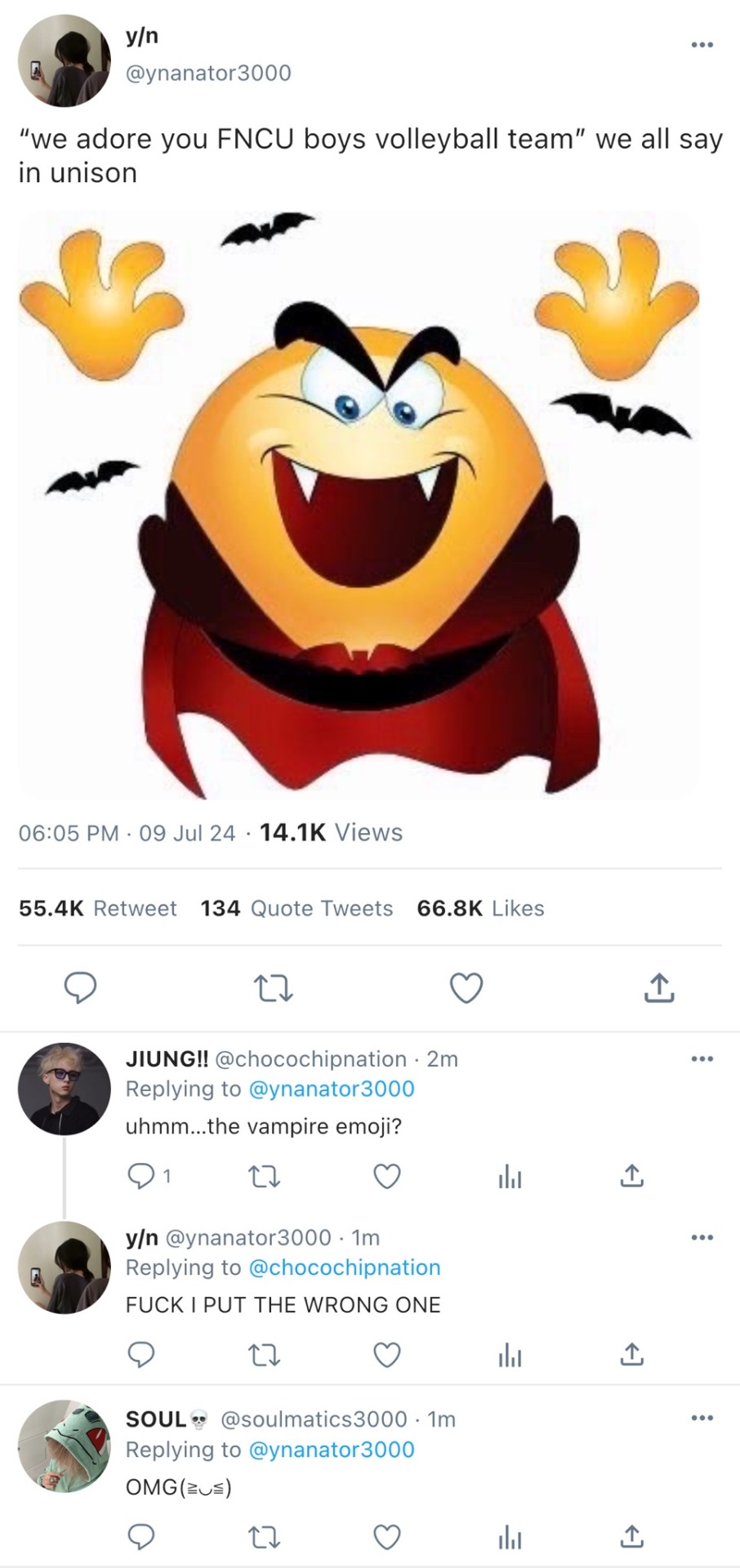
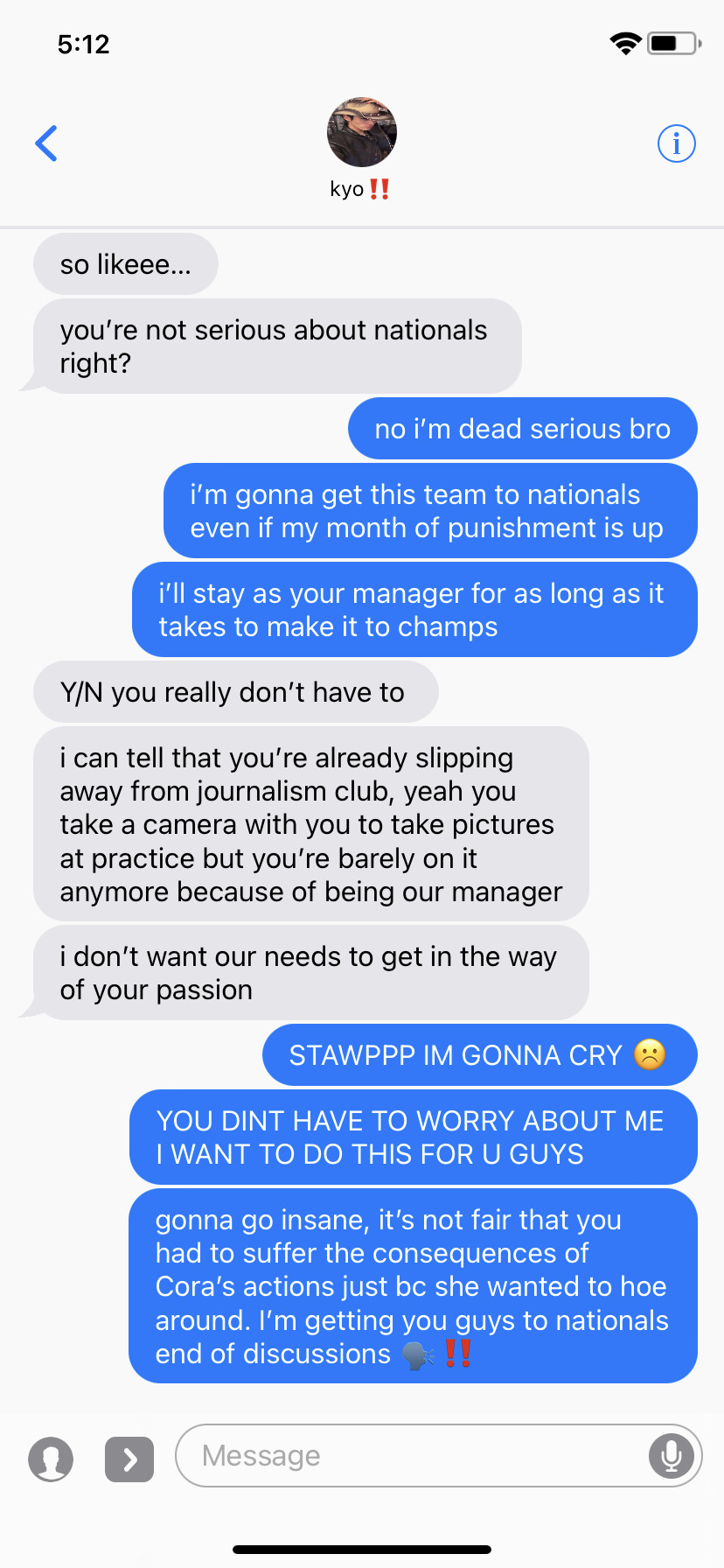
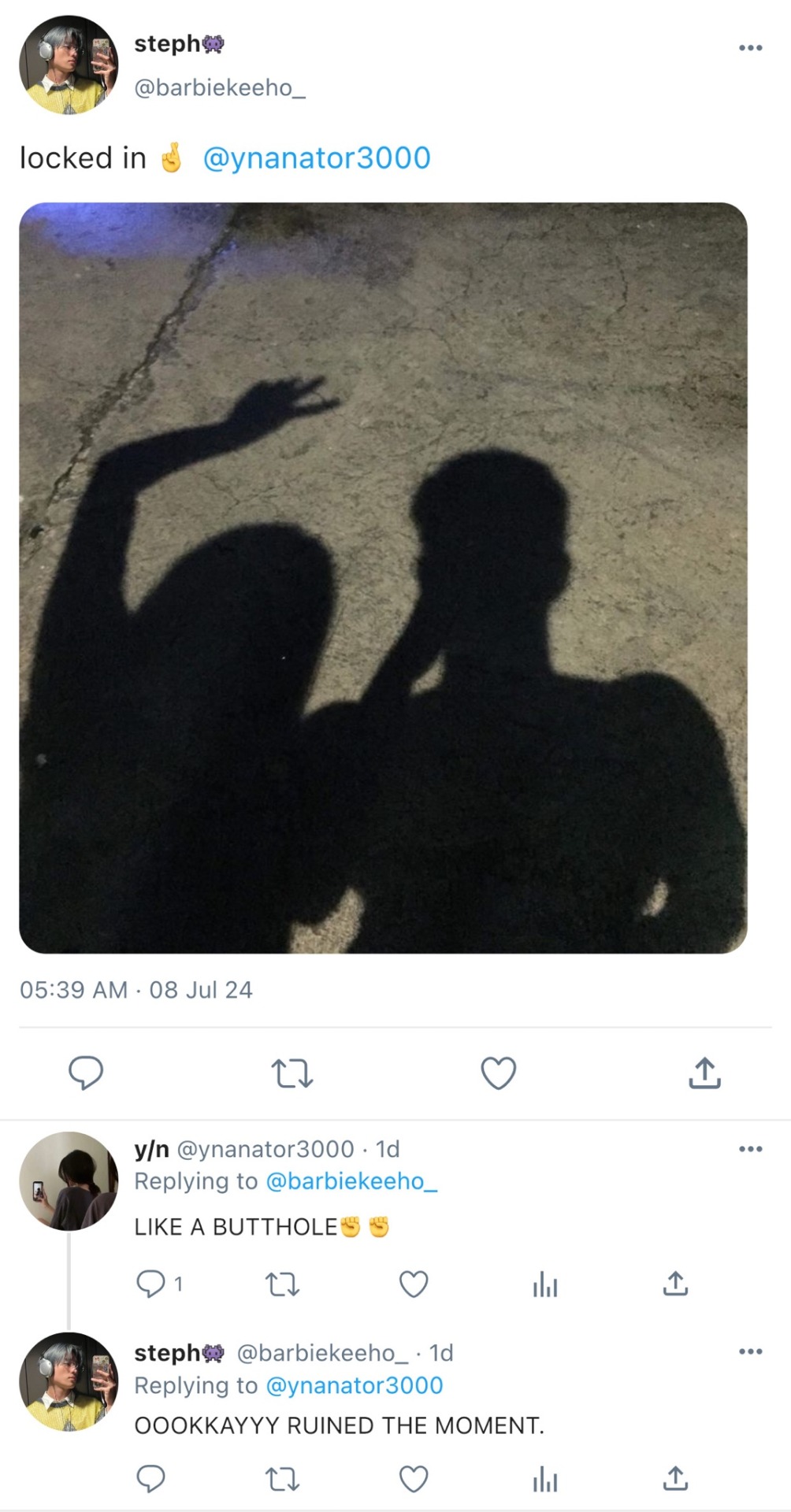
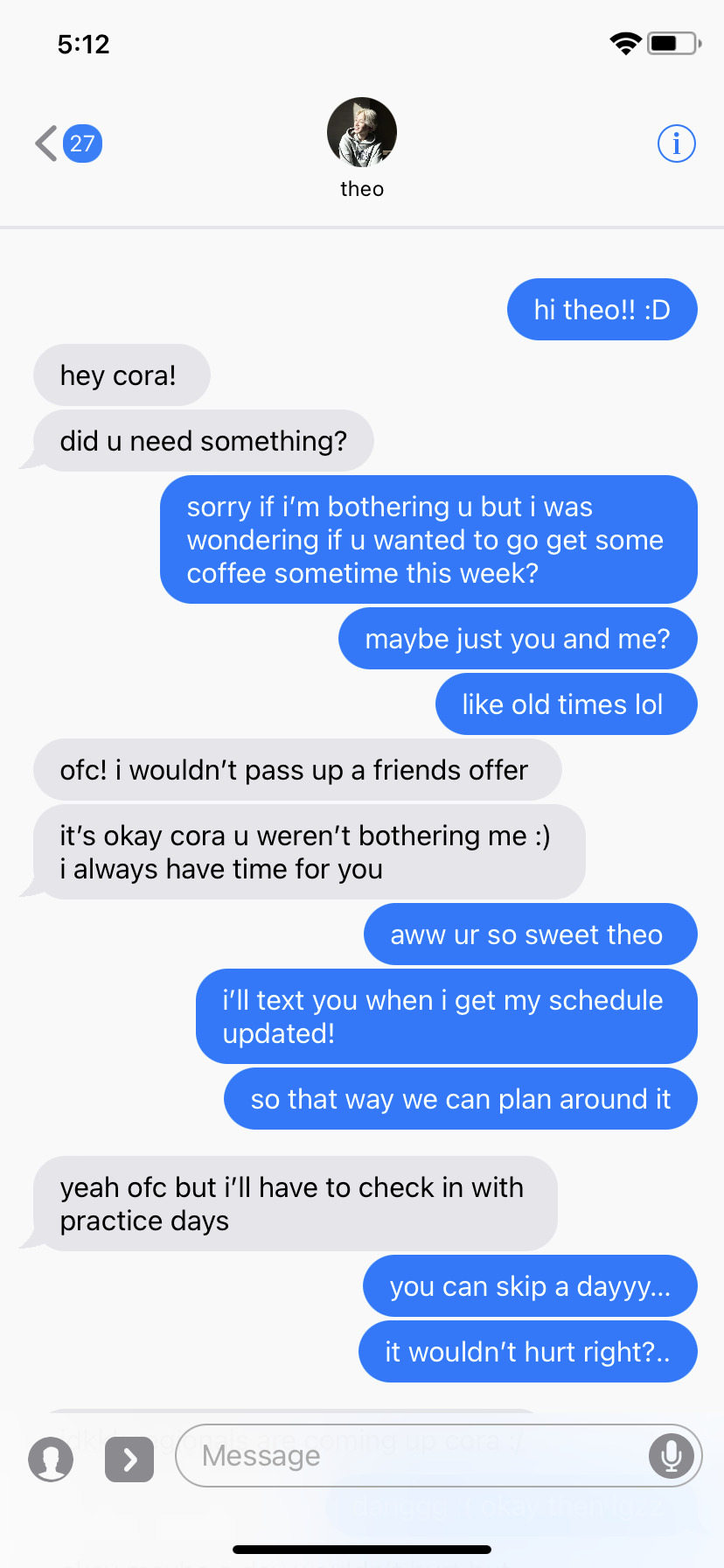
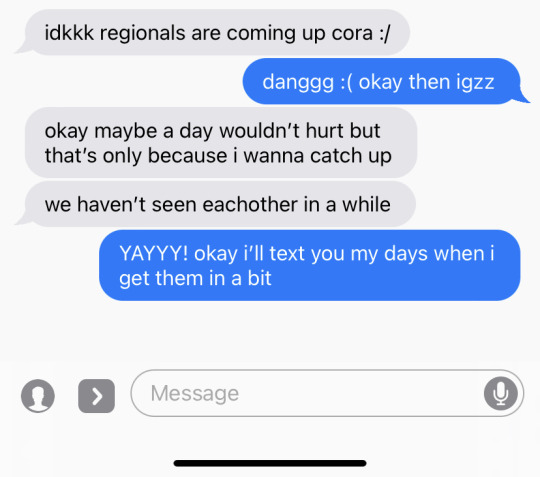
prev | m.list | next
-
-
-
-
tags!: 🍰: @inthesunnn @nini-04 @hopeless-romantic-mentality @222brainrot @therealbobbyshloby @miyukisv @beommii @soobiverse @blossominghunnie @sleepyxxhead @vehaez @sulkygyu @x0llaz @soobnuuy @jjunie-0 @jilxe @captivq
keb notes: OKAY TRUST WE ARE IN END GAME NOW…I HAVE ALL THE CHAPTERS PLANNED AND DRAFTED I JUST NEED TO POST THEM!!! no more procrastination😈
26 notes
·
View notes
Text
In addition to being an ex-Hillel president, a UJA board member, the mother of a Maccabi athlete and a Bronfman Youth Fellow, I’m a contributing writer to multiple Jewish publications and an author of Soviet-Jewish historical fiction.
I’ve also been a New York City school consultant for 20 years. I help parents navigate the admissions process for not only private schools but the city’s public schools, too. Together, we figure out not just the best school fit for their child but how to maximize their odds of getting in.
Here in New York City, students are required to apply to public high schools (and public middle schools and kindergartens, too). Much like college applications, the public school admissions process is byzantine, often contradictory and extremely opaque. It can be an enormous source of stress for families — there are tests, grade tiers and ranked-choice strategies to contend with — and it’s not uncommon for kids to be rejected from a public school, sometimes even their zoned, local public school.
That’s where my role as a consultant comes into play. By factoring in a student’s academic strengths and weaknesses — along with assessing the school’s sports and arts offerings, say, or their support for students with disabilities — I help parents strategize their applications so that their child lands at a school that’s right for them.
Ahead of the city’s public high school application deadline on Dec. 4 — with middle school and kindergarten application deadlines to follow — I’ve noticed a new concern among many of my clients: Parents are now taking into account just how safe a school’s climate is for Jewish students.
Since the Hamas invasion of Israel on Oct. 7, 2023 — killing some 1,200 people, taking another 251 hostage, and launching the ongoing war that has killed tens of thousands in Gaza — antisemitism has risen sharply in New York City. According to NYPD data, hate crimes targeting Jews have surged over the past year.
Antisemitism has reared its ugly head in the city’s schools, too. Last November, city officials investigated Hillcrest High School in Queens after students allegedly rioted over a teacher’s participation in a pro-Israel rally. In March, swastika graffiti “rattled” Beacon High School in Hell’s Kitchen, while earlier that month, teachers at Brooklyn’s Origins High School complained of a hostile, antisemitic work environment. “I’ve had students call me a ‘dirty Jew.’ I’ve had students draw swastikas on my desk and bulletin boards,” global history teacher Daneille Kaminsky told CBS News New York. “I’ve had students tell me they wanted to kill my family.”
Such sentiment isn’t exclusive to public schools. In June, the New York Times wrote about parents at the private Elisabeth Irwin High School filing a grievance after their children were taken on a field trip to be “subjected to anti-Israel and anti-American propaganda.” Earlier that month, David Lourie, the head of school at the Upper West Side’s Collegiate School, stepped down after an internal audit found evidence of “religious and cultural bias,” including antisemitism.
But there have been other, less publicized incidents. “On Monday, Oct. 9, my child came to school and found their teacher chanting, ‘Palestine all the way! Israel is going to get what they deserve!’” a Brooklyn mother, whose child attends a public high in Manhattan, told me. “When my child complained to the administration, they were accused of harassing the teacher.”
At my own daughter’s public high school in Harlem, a swastika was drawn on a wall immediately following Oct. 7; another was carved into a desk at the beginning of this academic year. The principal sent out an email encouraging everyone to be tolerant of different points of view, and musing that the person who drew the symbol probably didn’t know what it meant.
“Did he just ask us to be tolerant of swastikas?” I double-checked with my husband.
My daughter is currently a senior who loves her school and her friends. It is too late for me to consider moving her.
But, increasingly, I’ve noticed that switching schools has become an imperative for some of my clients.
“In math, the better performing kids were sitting at one table, and classmates were calling it ‘Jew table,’” a mother whose child was a freshman last year at a highly coveted Manhattan public high school told me. “She was sending me pictures from the bathrooms of stickers that said ‘resistance by all means.’ The school was covered in swastikas and graffiti. When I emailed the principal, the response was, ‘Your daughter is wrong about the swastikas and graffiti, and we already called the police and we are wiping everything every day.’ She finished 9th grade but didn’t want to return to school this year.”
Such incidents have many Jewish parents on high alert — and confused about what the best options for their children may be.
Lena, a Brooklyn mom who asked me not to use her last name, told me that when her eldest child applied to middle school two years ago, she was looking for schools that were close to home, had good reputations and plentiful after-school programming. Now, however, as they consider high schools, “I’m absolutely looking at which schools have a reputation for being safe for Jewish students,” she said.
For some parents, sending their children to a Jewish day school is the obvious solution.
Naomi Levin Schoenkin, whose two children attend Emet Classical Academy, a new Jewish grade 5-12 private school, confessed, “After Oct. 7 it became clear to us that we wanted an education that was more energetic about the contributions of Jews and Jewish values to the world. It became increasingly exhausting to justify that to non-Jewish educators.”
This isn’t to say that every non-Jewish school, whether public, charter or private, is a hotbed of antisemitism. My sample set is obviously skewed as my clients are a self-selecting group; they come to me because they are unhappy with their schools and looking to make a change. I don’t hear from the happy parents.
Many schools host very active Jewish student unions and affinity groups for students and families. A swastika may have been inked on a wall and another carved into a desk at my daughter’s school but, in between these incidents, there was also a Cultural Day when students came bearing their ancestral flags. My daughter took many pictures with her friends — each draped in a flag from a different country, like my daughter was in the flag of Israel — with their arms wrapped around each other, making peace signs. Some of her teachers have also facilitated calm, rational and balanced discussions around issues of Israel, as well as the protests taking place only a few blocks away at Columbia University.
For parents hoping to avoid sending their child into a hostile school environment but unsure of what to look for, I recommend first and foremost speaking to other parents — preferably ones you weren’t directed to by the school. For starters, ask your friends and co-workers where their children go to school. Many schools have dedicated Facebook groups that are independent of the administration and can be excellent resources for incoming parents.
There are also social media groups specifically dedicated to the topic of antisemitism in various institutions — including schools — such as NYC Parent Alliance, the NYC Public School Alliance and End Jew Hatred. While these advocacy organizations are by nature on the lookout for antisemitism, parents affiliated with these groups will be able to alert you to a school’s potential red or yellow flags, and can provide perspectives that may differ from the typical open house jargon that promises a vague “respect for all.”
When considering a school for your child, It is perfectly appropriate to ask for a list of what books students are assigned in English and Social Studies classes. If a school is reluctant to provide it, that’s a red flag. (No, you are not a book banner if you ask what your child will be reading. You are not demanding that the book be withdrawn from other children. You are trying to get an indication of what’s on the curriculum and if it’s right for your child.)
You can also go on the school’s website and see who their recent guest speakers were, the topics of their assemblies and what decorations are hanging in the classrooms. For those willing to go the extra mile, you can check social media accounts: the school’s official ones, and the personal ones of teachers. (No, it’s not stalking if they make their posts publicly available.) There are some NYC teachers — from the high school level all the way down to pre-K — who are proud to share their anti-Israel views.
NYC families have until Dec. 4 to finalize their public high school application list, until Dec. 20 to submit their public middle school list, and Jan. 24 for kindergarten.
Based on all the concerns about antisemitism I’ve heard over the past year, I strongly suggest parents and students implement at least some of the above suggestions before committing to any school, public or private, for 2025 and beyond.
15 notes
·
View notes
Text
Tamil Nadu Board Exam Results: A Comprehensive Overview
The Tamil Nadu Board Result of Secondary Education (TNBSE) plays a critical function in shaping the instructional landscape of the kingdom. The board is accountable for carrying out examinations for classes 10 and 12, which are pivotal in determining students' academic paths. The effects of these examinations are surprisingly anticipated every yr, impacting students' futures and educational choices.


Examination Structure
The Tamil Nadu board checks generally encompass principal levels: the Secondary School Leaving Certificate (SSLC) for class 10 and the Higher Secondary Certificate (HSC) for class 12. The SSLC assessments usually take area in March, while the HSC exams observe quickly after. These tests cover various topics, such as Tamil, English, Mathematics, Science, and Social Science, among others.
Importance of Results
The outcomes of these board assessments are enormous for several reasons:
Academic Progression: For magnificence 10 students, the SSLC outcomes determine their eligibility for higher secondary education. Depending on their rankings, students can select among diverse streams including Science, Commerce, or Arts in class 11.
Higher Education Opportunities: Class 12 students, however, need their HSC consequences for university admissions. Performance in those tests is critical for securing seats in universities and expert publications.
Career Decisions: The results additionally impact career alternatives. High rankings can open doorways to prestigious establishments and aggressive courses, while lower scores may also require college students to recall opportunity paths or remedial measures.
Psychological Impact: The strain surrounding board examination outcomes can considerably affect students' intellectual health. The anticipation of consequences can cause anxiety, stress, and, in some cases, sadness, highlighting the need for adequate counseling and aid systems.
Result Announcement Process
The Tamil Nadu board commonly publicizes the examination results in May or June, some weeks after the crowning glory of the exams. The results are made available online on the legit TNBSE website, along with different structures, making sure easy get admission to college kids and dads and moms.
In recent years, the board has also delivered SMS offerings, allowing college students to access their results directly on their mobile phones. This initiative aims to ensure that students in far-flung regions have identical access to their results, thereby promoting inclusivity.
Performance Trends
Every 12 months, the Tamil Nadu board sees various performance trends based totally on several elements:
Overall Pass Percentage: The ordinary bypass percentage is a critical metric. In recent years, the SSLC results have frequently visible pass percentages in the variety of ninety-95%, while the HSC results can vary more widely, depending at the subjects and the general trouble of the exam.
Subject-Wise Performance: Typically, students perform well in languages and social sciences, even as topics like Mathematics and Science can also see a decrease in common ratings. This fashion regularly sparks discussions about the need for a curriculum evaluation and stepped-forward coaching strategies in these subjects.
District-smart Performance: The results also are analyzed at the district level, with some districts always outperforming others. These statistics is precious for policymakers and educators to become aware of regions desiring interest and assistance.
Post-Result Scenario
After the results are announced, the subsequent steps for students include:
Counseling and Admission Processes: Students ought to make crucial selections concerning their in addition schooling. Many faculties and colleges arrange counseling periods to help students recognize their options based totally on their ratings.
Re-assessment and Re-checking: Students who are disappointed with their effects have the option to use for re-assessment or re-checking of their solution sheets. This system is vital for individuals who agree that their overall performance is no longer correctly pondered within the initial grading.
Supplementary Exams: For college students who did not bypass, the board gives supplementary tests, normally performed a few months after the primary results are declared. This gives students a second chance to clear their subjects.
Challenges Faced
The board consequences method isn't without its challenges. Issues such as administrative delays, discrepancies in grading, and the high stakes associated with the exams can result in significant pressure for college kids and educators alike. Furthermore, the impact of the COVID-19 pandemic has raised issues approximately the preparedness of college students, as many had to adapt to online learning, which varies in effectiveness.
3 notes
·
View notes
Text
Manlililok ng Buhay: Sir AA Manacmol at ang Guidance Office
Ni Job Balanon | Nobyembre 18, 2024

Mga antok o kung ‘di man ay mga tulog na estudyante ang walang ganang pumapasok sa klase ng Group Guidance. “Boring” at nakatatamad daw ito sabi ng ilan. Ngunit alam na ba talaga nila ang tunay na tungkulin nito sa paaralan?
Si AA Defensor Manacmol, o mas kilala bilang Sir AA, ang isa sa mga Guidance Counselors ng UPIS. Sa kasalukuyan, hinahawakan niya ang Batch 2025 at 2029 bilang kanilang Guidance Counselor, na siyang tumatayong tagapayo at guro sa iba’t ibang aspeto ng kanilang mga buhay at pagkatao.
Bilang isang indibidwal, kilala si Sir AA bilang isang palangiti, mabait, at mapang-unawang empleyado ng UPIS. Madalang na kumunot ang kaniyang noo at talagang pasensyoso sa mga estudyante. Ayon sa kaniya, mahilig siyang maglaro ng Valorant, mangolekta ng Star Wars figures, at gugulin ang oras kasama ang kaniyang pamilya bilang mga libangan sa labas ng trabaho.
Ngunit bilang isang Guidance Counselor sa loob ng apat na taon niya rito sa UPIS, isinusulong niya na tulungan ang mga estudyante sa kanilang Social, Emotional, and Career Development.
Ayon sa kaniya, nagsisimula ito sa mga unang taon ng estudyante sa UPIS kung saan tinuturuan sila ng iba’t ibang learning styles at strategies, kasama na rin ang pagkilala sa kanilang personal values. Pagkatapos, sa mga susunod na taon, ituturo naman sa kanila kung paano magtrabaho bilang isang pangkat o teamwork; higit pa, ang etika ng pagtatrabaho sa isang aktuwal na workplace; kabilang riyan, kung paano humindi, paano makipag-usap, at kung paano gumalaw kasama ang ibang tao. Panghuli, sa paglapit ng mga estudyante sa kanilang pagtatapos sa UPIS, ginagabayan sila ng Guidance sa pipiliin nilang larangan sa hinaharap, kabilang ang pipiliin nilang strand, at paghahanda para sa University of the Philippines College Admission Test (UPCAT).
Kung ihahambing, ‘tulad ng isang manlililok ang trabaho ni Sir AA. Hinuhubog at nilililok niya ang buhay at pagkatao ng kaniyang mga estudyante upang ihanda sila sa kanilang hinaharap bilang mga mag-aaral, at propesyunal ng ating bansa.
“Ang Guidance ay hindi discipline office” — Sir AA Manacmol, 2024

Ayon kay Sir AA, Career at Counseling daw talaga ang core value ng Guidance. Gayunpaman, lalo na sa panahon ngayong laganap ang iba’t ibang isyu sa mental health, importante rin sa kanilang trabaho ang emosyonal na paggabay sa mga estudyante.
Sabi niya, maaari raw gawing takbuhan ang Guidance Office tuwing may mga emosyonal na pangangailangan ang mga estudyante. Sa tuwing nahihirapan sila na pasanin ang kanilang mga responsibilidad sa eskuwelahan, mga kaibigan, o kahit na sa pamilya, bilang halimbawa, maaari niyang tulungan ang mga estudyante sa pamamagitan ng pagtukoy sa ugat ng kanilang problema at pagbigay ng iba’t ibang paraan para solusyonan ito. “Puwedeng tingnan ang environment, sa bahay, tingnan ang factors sa bahay, sa friends din, ‘yung personal strategies…” giit niya tungkol sa kaniyang trabaho.
Kaakibat ng kaniyang trabaho na bigyang-suporta pang-akademiko at pang-emosyonal ang bawat mag-aaral ng UPIS, lalo na ng mga estudyante na kaniyang hinahawakan, ang mahigpit niyang oras sa araw-araw. Ayon sa kaniya, isang suliranin sa kaniyang trabaho na dalawa o tatlong estudyante lang ang kaniyang personal na nakakausap sa loob ng isang araw pagkatapos ng kaniyang mga klase. Sa kabila ng kagustuhan niya na dagdagan pa ito, madalas na kinakailangan na ng mga estudyante na umuwi kung kaya’t nawawalan na sila ng pagkakataon na mag-usap.
Gayunpaman, ayon sa kaniya, “In times of crisis, you can call your guidance counselors anywhere, anytime.” Ibig sabihin, bukod sa tipikal na Lunes hanggang Martes, 8:00 n.u - 5:00 n.h., na iskedyul ng Guidance, maaaring takbuhan ang mga guidance counselors, kasama siya, sa anumang oras, lalo na kung mayroon talagang “mabibigat na problema na bumabagabag sa isipan”.
Para kay Sir AA, maraming estudyante ang nakaiintindi na sa kabuuang tungkulin ng Guidance.
Naituro naman na raw kasi sa kanila ito noong Grado 7 pa lang. Ngunit kung oobserbahan ang mga estudyante, marami ang nakalilimot.
Sa tuwing klase ng Group Guidance, marami sa mga estudyante ang tinatamad na pumasok at magbigay ng atensyon. Mayroong mga pagkakataon na tuluyan nang nagka-cutting ang mga estudyante sa klase na ito at hindi na pumapasok. Dagdag pa, tinitingnan din ang Guidance bilang isang lugar kung saan pinapagalitan at pinaparusahan ang mga estudyante. Lingid sa kanilang kaalaman, maaari nilang magamit ang Guidance upang mailahad ang kanilang mga nararamdaman at humingi ng payo sa buhay. Kumbaga — tila underutilized ito. Para kay Sir AA, hangad niyang mabigyan nila ng pagkakataon ang Guidance Office na mapuntahan at maranasan. Huwag daw sana sila na matakot at subukan na maupo at makipagusap kasama ang kanilang mga Guidance counselors.
Giit pa niya, “Hopefully ang perception ng UPIS kapag sinabing ipapadala sa Guidance ay magaan ang loob dahil mashe-share niya ang kaniyang emotions.”
Sa paglilok ng mga estudyante, 24 oras at matagalan ang trabaho. Kaya huwag malikot at matakot sa bawat pukpok ng iskultor, sapagkat ito’y para lamang pagbutihin ang binubuong obra. Bakit hindi mo bisitahin si Sir AA? Baka matulungan ka niya sa iyong mga problema.
2 notes
·
View notes
Text
Technology Integration Education Research A New Era
Technology Integration Education Research era has revolutionized the manner college students examine and teachers coach. From interactive digital gear and virtual classrooms to artificial intelligence (AI) and information-driven insights, generation is reshaping schooling on a global scale. This transformation is going beyond replacing conventional chalkboards with smartboards or textbooks with capsules. It offers a extra dynamic, personalized, and efficient studying experience that prepares college students for the demands of the twenty first-century workforce. As we discover the profound effect of technology integration in education, we're going to have a look at its advantages, challenges, and the approaches it's far shaping the future of mastering.

The Evolution of Technology in Education
Historically, education has been characterized by using traditional techniques of practice, which include lectures, textbooks, and hands-on activities. While these stay treasured, the appearance of era has brought a wealth of recent tools and assets that enhance the coaching and learning manner.
Technology in education began with the introduction of computers and the internet in classrooms, but it has on account that advanced into an atmosphere that includes smart gadgets, academic software program, on-line gaining knowledge of systems, and virtual studying environments. Schools and universities now contain era in multiple ways, from mixed getting to know models to fully on-line courses. This evolution allows for extra interactive, bendy, and reachable schooling for inexperienced persons of all ages.
The Benefits of Technology Integration in Education
Personalized Learning:
One of the most huge benefits of generation in schooling is its capability to facilitate customized gaining knowledge of reviews. With the assist of AI and system gaining knowledge of algorithms, educational platforms can tailor classes, quizzes, and exercises to individual college students’ learning speeds and patterns. This guarantees that each scholar gets guidance at their own tempo, minimizing frustration and maximizing comprehension.
Tools like adaptive getting to know software program analyze a scholar's progress and offer focused content that addresses their particular wishes. For instance, a pupil suffering with math can obtain extra practice troubles, at the same time as a greater advanced scholar is probably challenged with higher-degree questions.
Enhanced Engagement:
Interactive tools including instructional games, simulations, and multimedia content material make studying greater attractive and fun for students. Visual and audio elements help explain complicated concepts in approaches that conventional strategies won't, making studying extra reachable to visual and auditory inexperienced persons.
Virtual Reality (VR) and Augmented Reality (AR) are also more and more being utilized in lecture rooms to create immersive studying studies. Students can discover historical civilizations, visit outer area, or dissect virtual animals, all with out leaving the study room. These gear captivate students’ interest and make gaining knowledge of more memorable.
Collaboration and Communication:
Technology enables collaboration amongst students, instructors, and even worldwide friends. Tools like Google Classroom, Microsoft Teams, and Zoom allow for real-time communique, document sharing, and collaborative tasks. Students can paintings collectively on assignments, talk thoughts, and supply peer feedback, regardless of their physical area.
In addition to pupil collaboration, era permits instructors to hold higher communication with students and mother and father. Online portals and apps offer instant updates on grades, assignments, and attendance, allowing for more obvious and ongoing feedback.
Accessibility and Inclusivity:
It has the capacity to make schooling more inclusive via offering get admission to to resources for students with disabilities. For example, display readers and textual content-to-speech software help visually impaired college students, whilst speech recognition equipment help students with bodily or getting to know disabilities take part extra completely in elegance.
Online guides and digital textbooks additionally allow students from remote or underserved areas to get entry to high-quality education. With the rise of Massive Open Online Courses (MOOCs), novices from around the arena can take publications from top universities without ever stepping foot on campus.
Global Learning Opportunities:
It breaks down geographical limitations, allowing college students to connect to friends, teachers, and experts from around the sector. Through digital exchanges, college students can engage in cross-cultural projects, discussions, and studies. This international angle complements students’ expertise of various cultures and fosters empathy, crucial thinking, and worldwide citizenship.
Moreover, online structures like Coursera, and Khan Academy offer college students get admission to to world-elegance schooling from pinnacle universities and establishments, regularly at little to no cost.
Data-Driven Insights:
Importance technology integration education affords educators with powerful equipment to collect and examine records on scholar performance. Learning control systems (LMS) and evaluation equipment generate unique reviews on student development, figuring out regions of electricity and people requiring in addition attention. This facts allows instructors to make knowledgeable decisions, adjust coaching techniques, and provide centered interventions to help student getting to know.
Predictive analytics also can help become aware of students who are vulnerable to falling behind, allowing instructors to interfere early and offer the vital help to preserve them on the right track.
2 notes
·
View notes
Text
DeSantis' "Asylum" Offer to Jewish College Students
Florida Governor Ron DeSantis has issued an emergency order waiving various requirements for prospective transfer students into Florida public universities "who are seeking to transfer to a Florida university because of a well-founded fear of antisemitic or other religious discrimination, harassment, intimidation, or violence" at their current colleges.* The "well-founded fear" language is borrowed from asylum law, so if I were a Jewish student considering this offer I'd have to be concerned that DeSantis' next step would be to traffic me right back out of the state via a one-way to a New England island. In all seriousness, I have to give DeSantis a very faint tip of the cap here, if only because a few months ago I had a similar thought about whether colleges in blue states should offer a form of "asylum" running in the opposite direction -- assisting admissions or transfers of students leaving Florida public universities in the wake of DeSantis' assault on academic freedom and the rights of sexual minorities. I've certainly noticed an at least anecdotal uptick in "red state refugees" on the faculty side of academia, and it wouldn't surprise me to learn there's similar pressure on the student side. And on the other side of things, I actually wondered back in 2022 if DeSantis might seek to expressly differentiate himself from Trump on the subject of antisemitism. He hasn't really done so -- the seemingly obvious need of a GOP challenger to challenge Trump continuing to founder on the absolute inability of any Republican of substance to say a bad word about the Supreme Leader -- but he has tried to make "antisemitism" a relatively large part of his presidential narrative. And so as DeSantis' presidential campaign continues to flounder in the most pathetic fashion, this reads like a theatrical attempt to capture some of the Stefanik-magic from last month. Of course, DeSantis isn't alone here. For whatever reason, Republicans have learned that fake performative concern about antisemitism is the easiest route for craven gutless mediocrities to become media starlets, at least for a few days. That it keeps on filling this role is maybe something that the Jewish community needs to ponder -- while on the one hand I'm not convinced it's actually Jews who are most impressed by these stunts, there does seem to be a repeated gullibility on this front that deserves closer interrogation. How has the GOP become so convinced that this play, in particular, is a winning strategy for them? * Nominally, "other religious discrimination" encompasses Muslim students as well -- an interesting prospect as various Muslim and pro-Palestinian groups have begun adopting the broad understandings of "antisemitism" vis-a-vis discourse about Israel and Zionism promoted by some Jewish groups and trying to cross-apply them to similar broad understandings of Islamophobia vis-a-vis how university actors talk about Palestine and anti-Zionism. In practice, it's hard to imagine that will amount to much -- in part because of the vagueness surrounding "well-founded fear" of persecution, and in part because the sort of person who is concerned about that sort of Islamophobia is perhaps unlikely to find Florida an attractive destination to flee to. via The Debate Link https://ift.tt/WbQVEK9
7 notes
·
View notes
Text


The primary thought you must have firmly in your mind, keep in your minds forefront, when questioned by police is if they, your police interrogators, possessed a solid, airtight, open and shut case against you they would not be bothering to question you at all. When you are approached refuse to be question and immediately demand an attorney be present to advise you of your constitutional rights before any questioning takes place. In an ideal world, and by well, established law, at this point all questioning is supposed to stop but that does not always happen as “clever” ploys are used by police to get you to volunteer for questioning or be forthcoming with information that rarely benefits you, a suspect but furthers the goal of their investigation. Never answer any questions, no matter how innocent they sound, after you have invoked your right to an attorney. Do not respond to any question no matter how fucking tempted or how harmless you think it to be! When read the Miranda rights you were told anything you say can and will be used against you in a court of law and that is precisely what it means. Anything you might say of even a microscopic incriminating nature will be interpreted as a major admission by creative minds which can and will be used against you. You can take that fact to the bank.
Police interrogators aren’t your friends! Don’t provide them with anything to use against you, only provide your basic statistical personal information such as name, age, address, birthday and social security! [Different states have different laws about what information one is required to give, check out you local laws.] They’re your enemy if questioning you! Volunteer nothing! Either you are a suspect, friends or comrades are suspects or they are attempting to gather information to be used against you or your associates in the future. Your best interests, for you as a person, is the last thing on their minds. They’re merely performing their government job. Don’t allow yourself to become frightened or worse still to be lulled into a false sense of security. If they assault you, you can practice the popular American martial art of “I Sue!” Politely listen to their games. Remain silent no matter how long questioning lasts and don’t allow yourself to be wore down with time, a favorite tactic employed by skilled questioners. Recognize their games and realize their societal job function is to lock you up, to clear a case file that may result in the destruction of your life, making you, your family and loved ones suffer, sometimes for months and in the worse scenario for years! Remain silent. Sooner or later they will give up questioning you altogether. They will move on to a weak willed person to manipulate into prolonged imprisonment.
There are two logical outcomes to interrogations. When questioning is done you are free to leave to join family, friends or comrades within the movement, a wiser, stronger willed soldier tested by fire, or you are locked up. If locked up, and you kept your mouth shut, as soon as possible as the opportunity presents itself after you request your one allowed phone call then call a bail bonding company or your lawyer. Your attorney will be pleased he/she has a client who remained silent and did not give a statement! Because of your wise silence your attorney may be able to perform the magic taught in law universities and colleges of law. Your attorney may be able to have the case dismissed in court later due to the lack of evidence at preliminary hearing if you are charged with a crime! If you have felt the need of confession other than to a priest then forget about lack of evidence dismissals. You volunteered so endeavor to enjoy your unique incarceration experience, dummy! Should there be other evidence against you (“Opps! Forgot my gloves! Fingerprints are Hollywood bull shit, right?!”) by choosing to remain silent you have expanded your lawyer’s defense strategy choices which may win your case in court in front of a jury made up of people of average ignorance. Those of you who immediately thought of the O.J. jury, shame on you!
Give up nothing! Give up nobody! Don’t let your mouth put your ass in jail! Retain your rights! Remember you have the right not to incriminate yourself! Say nothing you or your friends will regret later in court while facing a stern faced judge and anal retentive, irate government prosecutor!
If you stayed with me to this point, the following will be some shallow, laughable mind games they may try to play on you with all the intensity of a child examining the first insect they encounter! Remember the cops talking to you, cajoling you to bear your soul, clear your conscience, “make yourself feel better” by telling them what happened because they “understand” after you do will laugh in your face, later in their locker room howl with laughter with each other about how utterly naive and gullible you are, call you an ignoramus and various other things, pat each other and themselves on the back and then pleased with their day’s work go home to screw their wife, boyfriend or girlfriend and kick their dog, or vice versa.
After the interrogation is over as a just reward for your cooperation with these hardworking public servants who serve and protect the public, you will be led away to a filthy barren cell reeking with combined odors of sweat, body waste in liquid and solid form, stale tobacco smoke and hopelessness with dubious characters as your cell mates. You may have to fight to keep a food tray, a place to sit or sleep if you aren’t immediately bailed out, you may discover yourself in a struggle to retain your shoes, shirt or jacket from predatory social prisoners. Remember how you felt your privacy was violated when a bathroom door was accidentally opened by another person on you at home, office, workplace, or elsewhere? Well, prepare yourself to forfeit all privacy expectation when Nature calls and you must answer the call in the sight, presence or within arm’s reach of other hapless people! You may be forced to learn what it means to literally and figuratively stand your ground for the first time in your life in a jail or in prison. You may be forced to defend your sexuality, defend yourself against sexual predators or some people are forced to temporarily switch their sexual preferences becoming bisexual by circumstance to survive incarceration intact. Yell for help? None is forthcoming except in cases of extreme brutality or mutually combative situations as those who swore to serve and protect usually turn a blind eye to prisoners. If you confessed to police interrogators, aided with the crime investigation efforts, in an ill-fated effort to prove yourself intellectually superior to those questioning you stuck your foot in your mouth, you have condemned yourself with your own words, then you will in all likelihood, not pay the slightest attention to the following word of caution. Once booked, fingerprinted and slammed in a cell you should not talk about your case with those around you who may express interest in why you are locked up! Each prisoner willing to listen to your tale of woe is a potential threat of showing up in court to testify against you as a jailhouse informant or a cop put in the cell with you whose sole purpose was to gain confidence and solicit a confession! You may be a target so realize this fact and shut the fuck up! A classic example of this is years ago in the early 1980’s, a State prisoner in Tennessee named Gary Hartman confided to a cell partner, Raymond Frazier, about a murder in which he was involved. Frazier got with another prisoner, Kenneth King, and they, with the aid of prison officials, contacted the attorney general’s office and law enforcement, collected a $1,000 reward and Hartman was convicted and sentenced to death. After a decade plus on death row Hartman’s death sentence was overturned on appeal and he was sentenced to life in prison. Just like during W.W. I and W.W. II, loose lips sink ships!
If you made a statement you may as well be pleased with your lousy career, life and health choices since you have volunteered for a stint, however prolonged or brief, in your chosen hell by “cooperating” with police? Not exactly a Norman Rockwell picture, is it? I refuse to “sugarcoat” this description of a potential first confinement experience horror to save your sensitivity or cater to your squeamishness. I would rather shock you to serious thought by speaking truth motivated by love for my sincere activist brothers and sisters engaged in struggle against the monsters of the earth guided by their hearts and knowledge of what is right rather than let you find out the painful hard way and begin a nightmare which will rob you of your life, of your productive years, and the progress you could have made during those forever lost years to the struggle.
#acab#organization#revolution#anarchism#daily posts#communism#anti capitalist#anti capitalism#late stage capitalism#anarchy#anarchists#libraries#leftism#social issues#economy#economics#climate change#anarchy works#environmentalism#environment#solarpunk#anti colonialism#mutual aid#cops#police#gestapo#survival#interrogation#anarchist survival guide for understanding gestapo swine interrogation techniques#staying free by shutting the fuck up!
5 notes
·
View notes
Note
Odd question, what were some of the strategies you used on college applications to get into Princeton? Topics on essays, portfolio work, books you picked up useful skills from, any resources you learned from and had to your advantage. Anything’s on the table, I’m asking around to everyone I can reasonably get ahold of for information.
Hey! It's cool you're interested in Princeton -- best of luck on your college search! But I really think this is a better question for your college admissions counselor or someone who does this professionally - everyone's individual best college application strategy is unique to them, and tbh I don't remember all that much about the process since it was 5 years ago for me. College admissions are a crapshoot anyway, so there's no guarantee that even if someone else's application was exactly the same as mine they'd get in now anyway!
I guess my advice in general is to apply for as many schools (including some safeties, some targets, and some reaches) as you have the bandwidth & funds to, and then talk to current students there after you get in to figure out how accessible their resources are, anything students know that isn't on the website, what the campus is like, etc. And also that you can be happy at a lot of different schools! Colleges are often what you make of them, and if you explore and create there you'll have a great time no matter where you go.
Best of luck!
4 notes
·
View notes
Note
How do you write a college essay? Does the person fill out a questionnaire and a resume or something? Cause I’m guessing the essay has to be pretty personal
omg it's like genuinely crazy... yeah it definitely has to be personal! usually the students we work with have been with the company since around middle school so the college consultants know them really well and we have a lot of meeting notes on them. students write drafts for the prompts per university, and we work with the college consultants (who typically have meetings with the students--i don't, lol) to figure out the outline and content of each essay! so we write/edit based on the student's answers combined with whatever admissions strategy the company wants the particular student to go in (like for example if we should depict them as someone very into agriculture or whatever).. half of the time that means starting from scratch and ditching the kid's (usually terrible) drafts 😭 then every time we finish our edits we send the essays back to the family/kid for their feedback and it's a back and forth process until everything's fully ready for submission
#if you're ever wondering how rich kids get into ivy leagues well that's what we're up to here 😐#not me sharing the work process with u help 😭#ans
8 notes
·
View notes
Text
Embrace your uniqueness–it's what makes you stand out

Standing out in the college admissions process involves showcasing unique qualities, experiences, and achievements. The point, however, is not simply to impress college admission officers with your accomplishments and achievements–it’s to show how you’ve invested time and energy to make a positive contribution to your community and the people around you.
Here are some strategies high school students can use to distinguish themselves:
1. Pursue Passion Projects
Deep Dive into Interests: Engage deeply in a subject or hobby that genuinely excites you. This could be anything from scientific research, artistic endeavors, coding projects, or community service initiatives. Joining one of Elite’s LEAD Extracurricular Programs is a great way to explore and build your interests.
Showcase Achievements: Document your progress and accomplishments. Create a portfolio, blog, or website to display your work. Virtually all colleges ask students to list their accomplishments in their college application. In addition, some colleges allow students to submit an optional portfolio to showcase their talents and skills.
2. Leadership and Initiative
Start a Club or Organization: If your school lacks a club that interests you, start one. Aside from demonstrating leadership and initiative, starting a club allows you to dedicate time and energy to something you truly care about.
Lead Community Service Projects: Identify a need in your community and organize a project to address it. This shows commitment and the ability to lead and inspire others. While service projects are oftentimes done in person, you can also utilize technology to address a cause or issue–for example, provide online tutoring, build a website or app to educate the members of the public about a pressing problem and direct them to support organizations working to address that problem, or host a podcast or YouTube channel discussing an important issue.
3. Unique Extracurricular Activities
Develop Skills: Learn and excel in skills that are not typically taught in school, such as coding, entrepreneurship, or foreign languages. If available, obtain a certification that measures your competency or proficiency in the skills you develop. Certification typically involves passing an exam or test from a recognized organization.
Competitions and Awards: Participate and win awards in regional, national, or international competitions, such as science fairs, math olympiads, or writing contests. Showcase what you’re good at, and go as far as you can. Many students continue to participate in various competitions in college, and demonstrating a high level of interest and achievement will help you stand out from other applicants.
Internships and Work Experience: Seek out internships and work experiences that provide unique insights or experiences related to your interests. These experiences will not only help you stand out from other college applicants but also help guide your choice of college major and possibly a career after college.
Artistic Creations: If you’re inclined towards the arts, create a substantial body of work, such as a short film, a series of paintings, or a novel. Applicants to fine arts, music, film, and theater programs in college are oftentimes required to submit a portfolio of their work.
Innovative Projects: Develop innovative projects that solve real-world problems, such as a tech solution for a local issue or an environmental initiative.
Cultural Contributions: Engage deeply with your cultural heritage or contribute to the cultural life of your community. Colleges want to build a class of students from diverse backgrounds, and demonstrating meaningful involvement in your community will allow colleges to see how you can contribute to the cultural life on campus.
4. Academic Excellence with a Twist
Advanced Coursework: Take advanced, honors, or college-level courses in subjects of interest. But don’t stop there: apply this knowledge in an activity or project to show its relevance and significance to your life. Enrolling in for-credit honors, AP, and dual credit courses through Elite is a great way to develop your intellectual interest during the summer and school year.
Unique Research Projects: Conduct independent research under the guidance of a mentor or through a research program. Colleges provide opportunities for students to engage in independent research as well as research with professors. Participating in research projects in high school will allow you not only to deepen your understanding of a subject you’re interested in but also to get a head start on research activities in college.
5. Exceptional Letters of Recommendation
Build Relationships with Mentors: Form strong relationships with teachers, coaches, or other mentors who can write compelling, personalized letters of recommendation. Simply doing well and getting a good grade in the class is not enough, however–you should demonstrate a genuine interest in the subject through discussions and application of the information and ideas you learn in class.
6. Compelling Personal Statement
Tell Your Story: Write a personal statement that communicates who you are, your passions, and your unique perspective. Make it memorable and authentic by including stories or experiences that highlight your unique qualities and how they have shaped you. If you’re considering sharing personal stories of overcoming significant challenges or adversity, focus on your personal growth in overcoming the challenge, not simply on the challenge itself.
Final Thoughts
To stand out in the college admissions process, you should focus on the things that are truly important to you and demonstrate your values and interests. Not only will you be able to enjoy what you’re doing but you will also answer the key questions colleges ask when they review college applications:
How are you changing your world–whether it’s your family, school, or community–for the better?
How will you contribute to and engage with the other members of our college community in the classroom, in the residence hall, and on campus?
4 notes
·
View notes